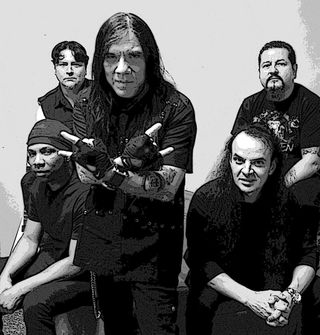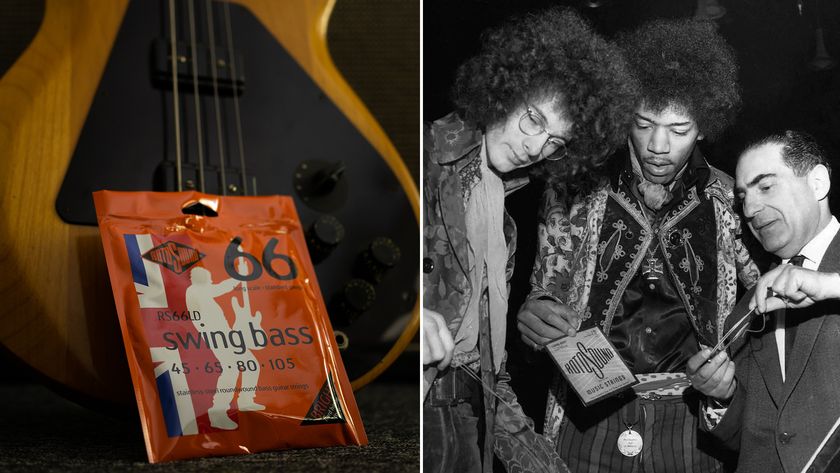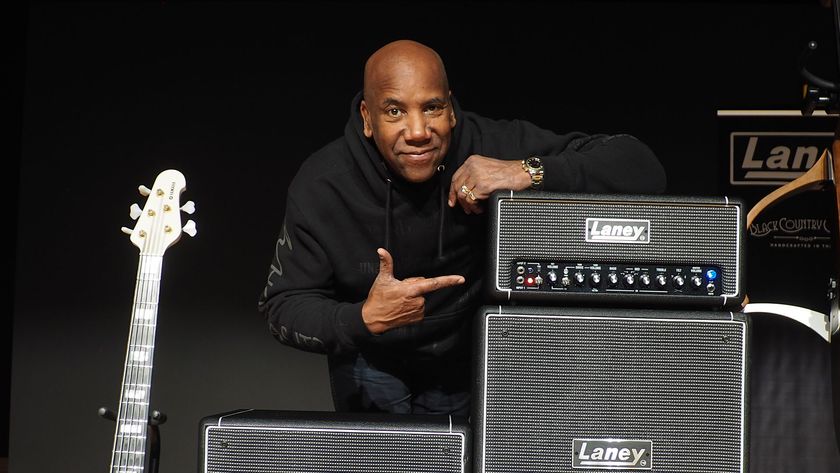Interview: Helstar Guitarist Larry Barragan on Celebrating 30 Years of Music and Metal

In 1981, 16-year-old guitarist Larry Barragan put together the first incarnation of Helstar.
Two years and several lineup changes later, the teenage band from Houston, Texas, recorded their first demo and broke through as a hit on the underground scene, quickly gaining national and international attention. Considering that this was long before the age of Internet access and social media, it was no small feat.
By the time 1983 came to a close, Helstar had signed their first record deal with Combat Records.
Fast-forward 30 years: Barragan, vocalist James Rivera, guitarist Rob Trevino, bassist Jerry Abarca and drummer Mikey Lewis are celebrating the third decade of Helstar, with a live album and DVD from a recent 30th anniversary show in the works, as well as planning a new studio album. Barragan recently discussed the past, present and future of his longtime band.
GUITAR WORLD: You were teenagers when you started Helstar. Were you ready? Can you ever be ready?
I think so. I think we were more ready as we got older. In our mid-20s we were a little more grounded and kind of knew what we needed to do and what needed to happen, but by that time it was almost too late. You have a small window to do something and I think it closed on us pretty quickly. To get to that next level, like Testament or Anthrax — bad business decisions and always having a lot of turnover within the band doesn’t help. I think changing members is a little more accepted now, but back then you wanted your bands to stay together, at least the core of the band. We were always losing two members at a time, and just business stuff, too — not capitalizing on certain things.
At least on Nosferatu [1989] we put our heart and soul into it, but no one liked it. I don’t know if it was ahead of its time. I hate to say that, but in a way it was, the subject matter and the stuff that we were playing on it wasn’t thrash or totally melodic; it was kind of in the middle, and I think at that point kids wanted to identify with one or the other. That’s just the way it went. We’ve never backed down on what we write or record, and we’ll continue to do what we feel.
Get The Pick Newsletter
All the latest guitar news, interviews, lessons, reviews, deals and more, direct to your inbox!
You grew up in Helstar. Is it possible to hold on to some of those feelings of youth?
I think so. I think we all are kids at heart. I’ll be 48 in July, so that’s kind of where everyone is hovering age-wise. We’ve spent a lot of time together and the growing up part is kind of natural. You’re around each other so much that you’re like brothers. For us, there’s still a lot of joking around, but when it comes down to business, there’s someone taking notes and keeping minutes. Once that’s over and it’s rehearsal time, it’s a little more relaxed and we have fun.
You’ve held this together through a lot of ups and downs and personnel changes. How did you retain the essence of the band?
Obviously, it comes down to James and myself and Jerry; he’s been there since Remnants of War. Since we’ve gotten back together with Rob, who played on Remnants and left for a long period of time and came back for the 25th anniversary, it’s been very natural and solid. Everybody is secure within the band. At the end of the day, it’s always going to be James and Larry’s band. We call a lot of the shots.
What’s the key to making it work when you go through personnel changes? Is it difficult to get in a groove, especially in a two-guitar situation?
Not too much. Usually it came down to the friendship and the technicality. You can tell, “That guy will be able to pull this off,” it’s not anything that gives you that feeling of apprehension. It usually came down to the personality. We’re all pretty easy going and we tried to pick people like that as well. When Rob came back it was real natural for us because we had stayed friends and always talked on the phone and hung out. That friendship carries on and it’s a blessing that you have someone you can hang out with and pick up guitars and practice.
Helstar and the bands you grew up on and cite as influences are still making great music and drawing crowds. What’s the key to standing the test of time?
It’s always going to come down to the songs, the music. If you’re putting out crap, then you’re not going to have longevity. That’s the bottom line. You have to evolve as well. You can’t stay the same band that you were on your first album. You have to keep changing, and hopefully the crowds change with you, understand what you’re trying to do and move with you as well.
But you’ve got to have the songs or no one is going to listen to you. Every album that we’ve written, we wrote the songs for that album. We didn’t write 15 and pick the best 10. We wrote ten, so we had to make sure that every song was worthy. For us, that’s always been paramount.
— Alison Richter
Alison Richter interviews artists, producers, engineers and other music industry professionals for print and online publications. Read more of her interviews right here.
Alison Richter is a seasoned journalist who interviews musicians, producers, engineers, and other industry professionals, and covers mental health issues for GuitarWorld.com. Writing credits include a wide range of publications, including GuitarWorld.com, MusicRadar.com, Bass Player, TNAG Connoisseur, Reverb, Music Industry News, Acoustic, Drummer, Guitar.com, Gearphoria, She Shreds, Guitar Girl, and Collectible Guitar.

“Walk Like an Egyptian was so silly. But solid players have asked, ‘What are you playing at the end?’” Vicki Peterson sees herself as “a bit of a hack player,” but she still made guitar-pop history with the Bangles – and guested with Tom Petty

“We had 15 minutes left, and it was time to go… I just started playing that riff. Then Lenny goes, ‘Whoa, what’s that?’” Lenny Kravitz guitarist Craig Ross reveals the serendipitous roots of a Kravitz classic









